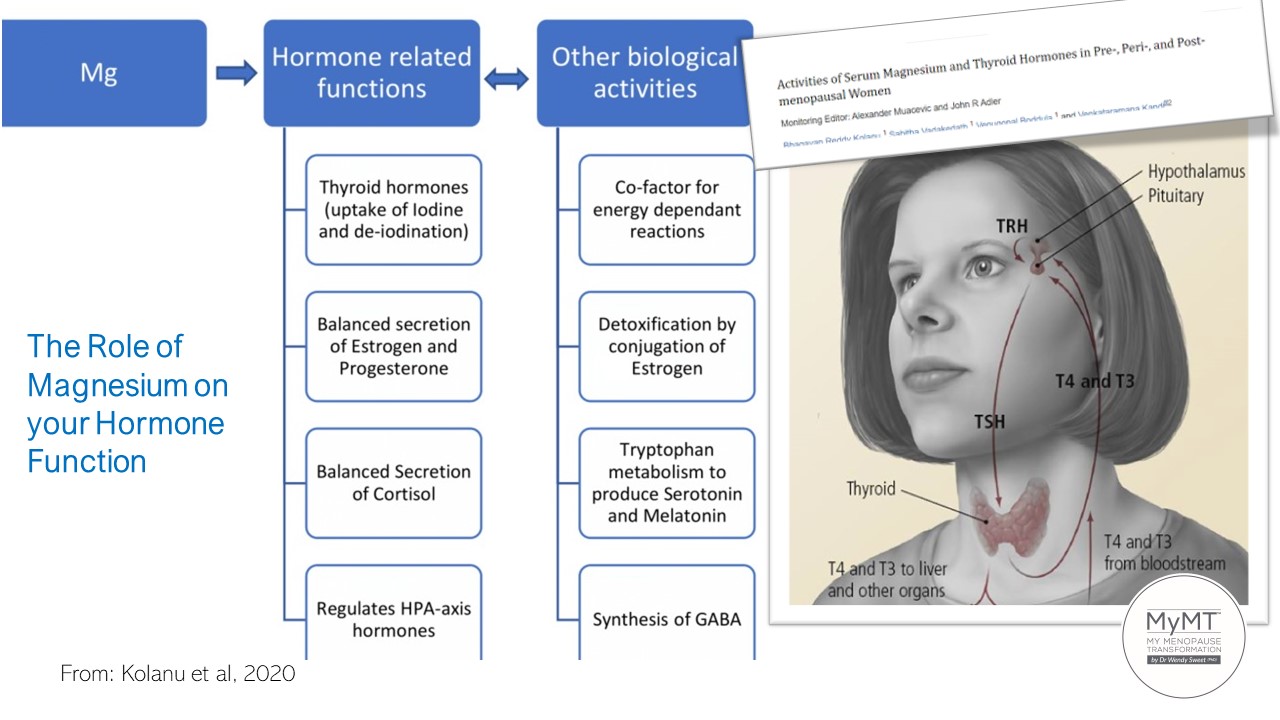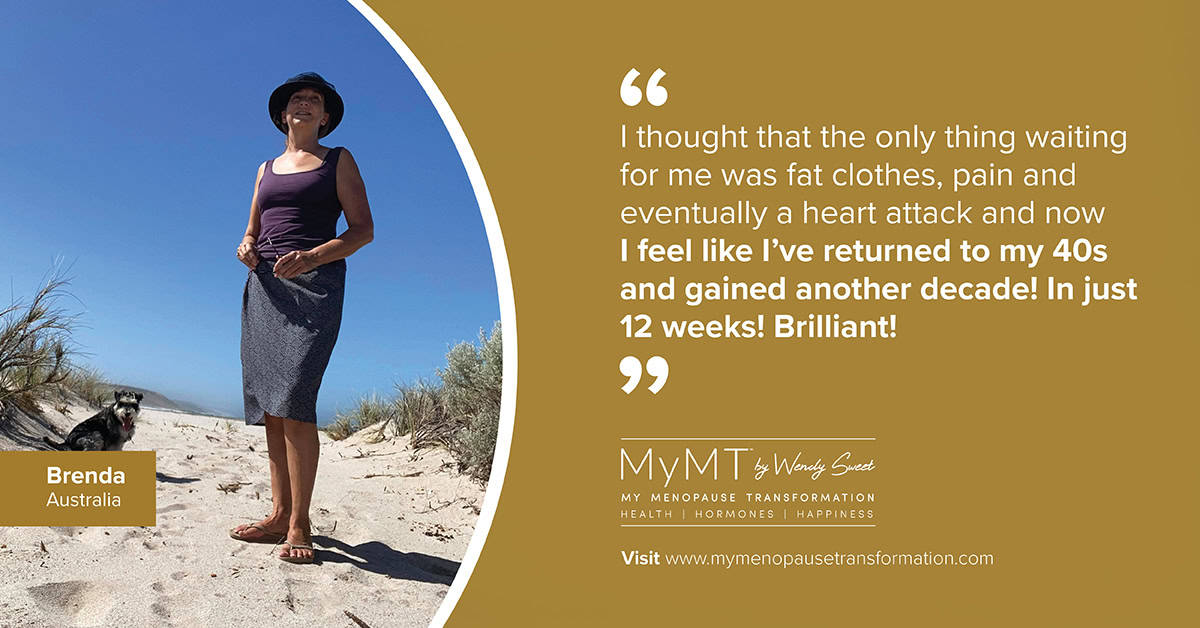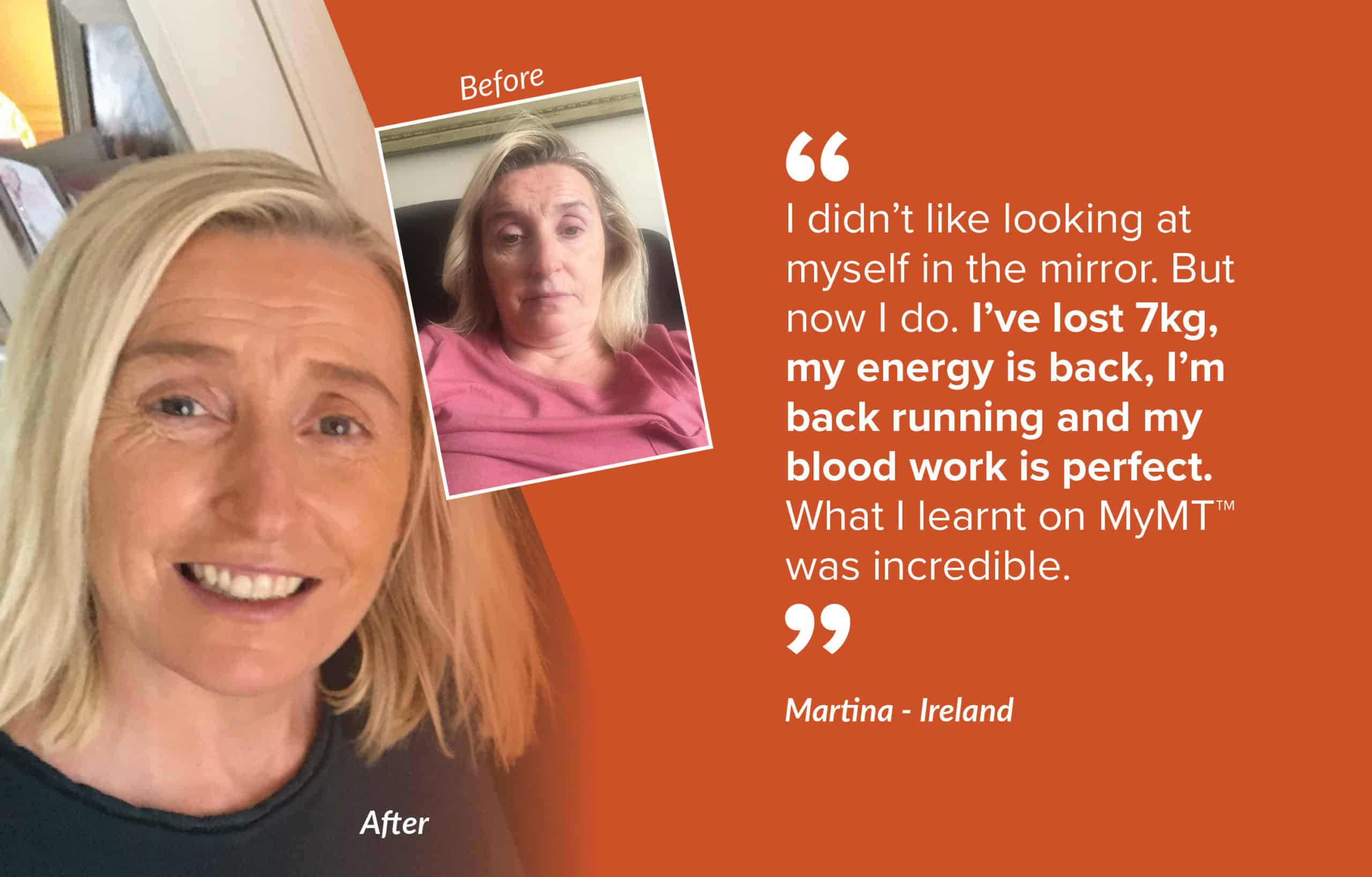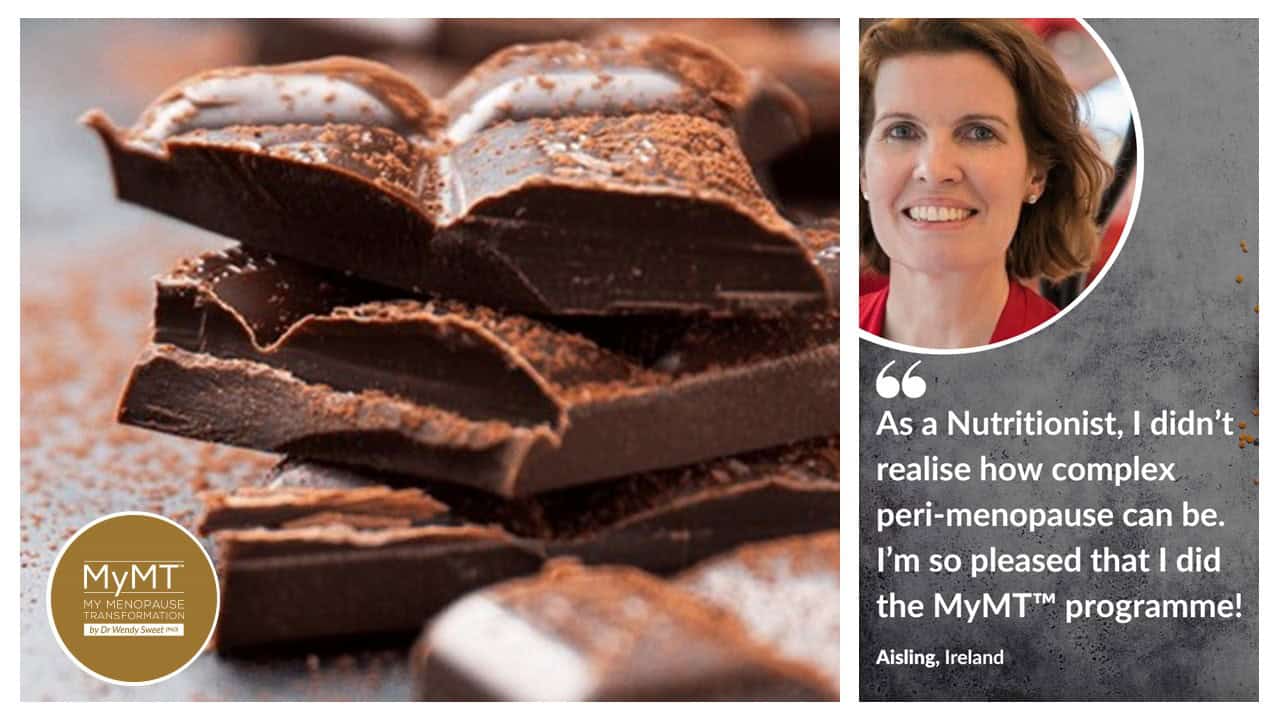Cocoa contains more phenolic antioxidants than most foods.
Knowing this is great news for those of you throwing some dark chocolate (preferably organic) into your shopping basket over the Easter break. You are doing your cells and tissues a favour if you have some dark chocolate – phenolic anti-oxidants are known to prevent inflammation and damage to cells, especially muscle cells. (Gonçalves et al., 2022)
But for women in their menopause transition, the nutrients that dark chocolate provides, are evidenced to improve mood, reduce anxiety, brain-fog as well as give you more energy – dark chocolate is a low glycemic index food. This means it helps to stabilise blood glucose levels.
The role of anti-inflammatory nutrients in our diet has fascinated me for the past few years ever since listening to Professor Gary Egger at a Lifestyle Medicine Conference in Australia, as I was working on my doctoral studies and designing the MyMT™ programmes. Professor Egger is considered one of Australia’s leading authorities on lifestyle and chronic disease.
When I began to understand that numerous menopause symptoms are due to changes in the body that are associated with ageing and inflammation, it made sense to explore nutrients that have positive benefits to reducing inflammation as we age. Afterall, every ‘disease of older age’ is inflammatory-related.
And as I often tell you, the changes we experience in menopause, make us vulnerable to more rapid accumulation of inflammation, particularly when you take into account our past lifestyle and the stress that builds up over the years.

Another well-known Physician in Lifestyle Medicine is American Physicist, Dr David Katz. His book, ‘The Truth about Food – why Pandas eat bamboo and why people get bamboozled’ is an interesting read. It was his book that got me interested in the health benefits of chocolate.
Whilst it’s best known as an indulgent confection that many of us feel guilty about eating, historically it has also been consumed for its purported healing properties. As Dr Katz mentions in his research on anti-inflammatory compounds and the effects of dark chocolate on human health,
“Cocoa can protect nerves from injury and inflammation, protect the skin from oxidative damage from UV radiation in topical preparations, and have beneficial effects on satiety (fullness) cognitive function, and mood.’ However as a word of warning, he also states,
‘As cocoa is predominantly consumed as energy-dense chocolate, potential detrimental effects of overconsumption exist, including increased risk of weight gain.’ Over the Easter break, please keep this in mind.

The good news for those of you navigating menopause and post-menopause, is that chocolate is high in dietary magnesium.
Dark chocolate (70%–85% cacao) provides 36 mg of magnesium per 100 kcal serving. This is more than three times the amount provided by milk chocolate which on average is 11mg of magnesium. (Katz et al, 2011).
I talk about the magic of magnesium in the MyMT™ Food Guide, explaining that by the time we reach post-menopause, our body needs up to 400mg a day.
Magnesium along with potassium and calcium all help to reduce risk of hypertension (high blood pressure) and atheroschlerosis (hardening of the arteries) – conditions known to prevail in post-menopausal women globally. Magnesium also helps to dilate those ageing blood vessels that are losing elasticity with the decline of oestrogen as does foods that are high in magnesium (dark chocolate) and foods providing nitrates which convert to nitric oxide, such as beetroot (beets), celery, spinach and arugula.
Cocoa is one of many food sources of substances that increase the production or bioavailability of endothelial nitric oxide (Katz et al, 2011). I often mention these foods in my coaching programmes, especially for women who are exercising and/or active in their jobs. This is because magnesium plays an important role in muscle function and health.
For those of you with restless leg syndrome or muscle cramps at night, then you need to know that magnesium is a co-factor in energy production and helps your muscles to relax.
If you’ve been on your feet all day or busy in a physical job or you are an exerciser, then perhaps some dark chocolate served with that mid-afternoon snack of celery, apple and peanut butter is indeed a healthy addition to your diet.
Dr Katz’s research also suggests that compounds in dark chocolate works to promote the normal rhythm of the heart. For those of you experiencing palpitations (and your Doctor hasn’t found anything wrong with your heart), then keep this in mind (as well as your Vitamin C intake which is important for your heart contractions too).

Recently I visited a bookshop and picked up a book on ‘Natural Menopause’ written by a Naturopath. It had a lot of great, relevant information in it, but much of her advice for improving menopause symptoms was positioned in taking various supplements, including magnesium.
I’m not averse to taking supplements at all, including magnesium, but unlike the information I have in the MyMT™ programmes and Food Guide, there was no list of high-magnesium foods that help to reduce the effects of inflammation in our blood vessels and muscles as we age. There was also no mention of dark chocolate.
Magnesium supplements and numerous other supplements have fast become the ‘norm’ for women to take in menopause. However perhaps we just need to follow Dr Katz’s recommendations and get a natural boost from the pleasure of eating 2-3 pieces of dark chocolate instead. Food for thought.
Have a happy Easter everyone. I hope you can listen to the Masterclass on Menopause webinar and/or join me on either of the 12 week programmes – Circuit Breaker for thinner/ leaner women or Transform Me, for your step-by-step weight loss modules.

References:
Chen, Y., Shen, F., Liu, J., & Yang, G. Y. (2017). Arterial stiffness and stroke: de-stiffening strategy, a therapeutic target for stroke. Stroke and vascular neurology, 2(2), 65–72.
DiNicolantonio JJ, Liu J, O’Keefe JH. Magnesium for the prevention and treatment of cardiovascular disease. Open Heart. 2018 Jul 1;5(2):e000775.
Egger G, & Dixon J. (2014). Beyond obesity and lifestyle: a review of 21st century chronic disease determinants. Biomed Res Int. 731685. doi: 10.1155/2014/731685. Epub 2014 Apr 7.
Katz, D. L., Doughty, K., & Ali, A. (2011). Cocoa and chocolate in human health and disease. Antioxidants & redox signaling, 15(10), 2779–2811.
Tanaka H. (2019). Antiaging Effects of Aerobic Exercise on Systemic Arteries. Hypertension. Jul 1:HYPERTENSION, AHA 11913179.

